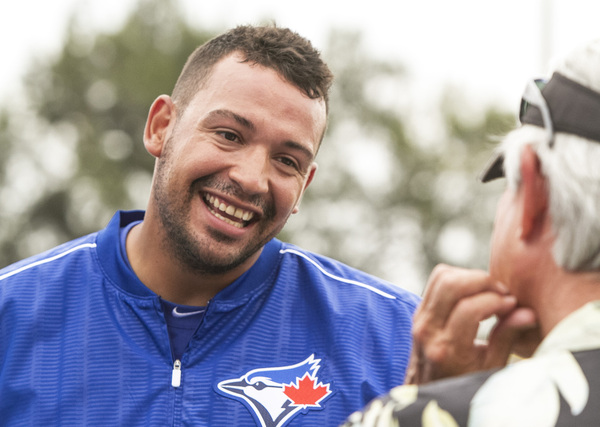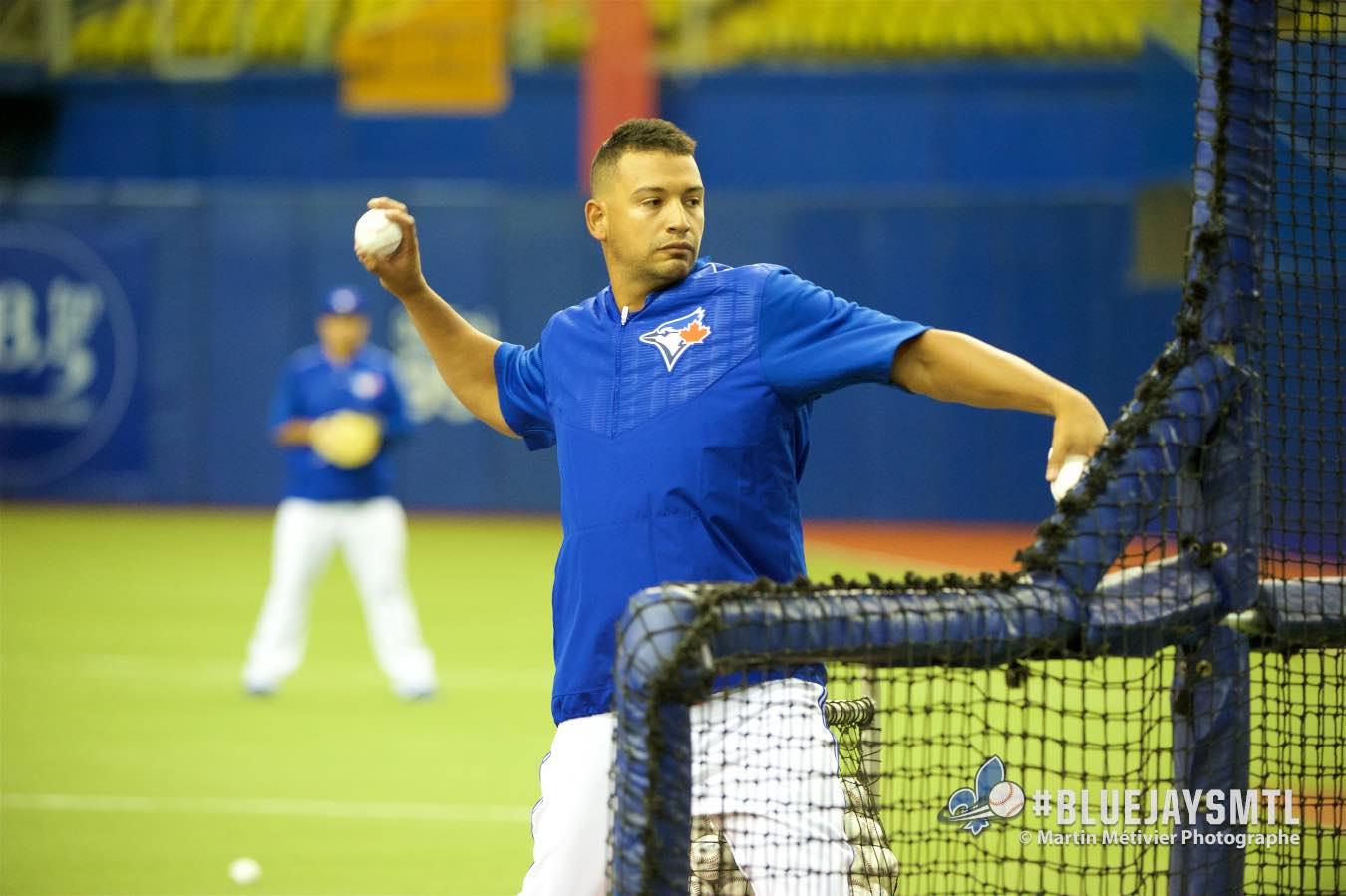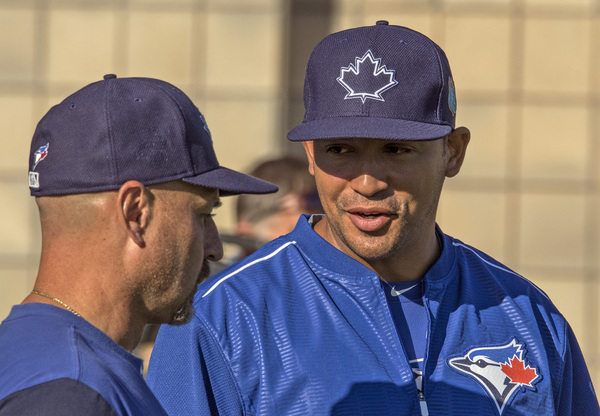Avr/160
In Former Quebec Capitales Catcher Josue Peley, The Blue Jays Are Getting Much More Than Just A Translator
Revue de presse
John Lott, Blue Jays Nation, le 31 mars 2016
When the Blue Jays needed a Spanish-to-English translator, it made perfect sense to look in a place where the official language is French.
Conducting the search was a Jays official whose first language is English. He called an old friend and teammate in Quebec City whose first language is French. They both agreed the man for the job was Josue Peley, whose first language is Spanish, but who spent his formative years in Montreal and also speaks fluent French and English.
Now the Jays now have a trilingual translator who also was a professional catcher for nine seasons, including the past four for the Quebec Capitales of the independent Can-Am League.
During his time with the Capitales, Peley not only translated for his teammates in three languages, but also was instrumental in the delicate negotiations that helped to bring several Cuban players to Quebec City – legally, not as defectors – well before the U.S. and Cuban governments started to play nice again.
Major League Baseball decreed that all of its teams must hire a Spanish-to-English translator this season. They didn’t say the successful candidate must be a former player with experience in international diplomacy. That, however, is what the Jays got in Josue (pronounced Ho-sway) Peley.
His main responsibility is to translate for Spanish-speaking players in media interviews as well as in conversations with coaches when necessary. It’s strictly a major-league job, but Peley understands that the need may be even greater on the minor-league side. That knowledge comes from having helped so many teammates deal with the media and each other throughout his playing career.
”I know, because when I was a player, I lived it,” he says.
He will also throw batting practice – that was part of his audition – and help out manager John Gibbons and his staff in any way he can, maybe hitting ground balls to infielders one day and warming up a pitcher the next.
Photo ci-dessus : Josué Peley lors de la visite des Blue Jays à Montréal les 1er et 2 avril 2016. (Photo : Martin Métivier, photographe)
“I think this is a great opportunity for me,” he says. “I want to learn everything, be able to do everything.”
***
This is how Peley got his new job. Andrew Tinnish, an assistant general manager for the Jays, pitched for the Quebec Capitales in 1999, his only professional season. That’s where Tinnish met Michel Laplante, who was the ace of the Capitales staff back then and now is the team president.
Tinnish and Laplante have kept in touch, and Tinnish was keenly interested in the Capitales’ Cuban coup, by which they struck a deal with the Cuban government to allow Cuban players to come to Canada and play for Quebec City the past two years. Their presence in a new country and a French-speaking province made Peley’s translation skills essential. Tinnish also knew Peley had played a key role as a translator during Laplante’s negotiations on his trips to Cuba.
“When I called Michel, it was with Josue’s name in mind, and I said, ‘We’ve got a position that we’ve got to hire for, a Spanish-speaking translator for the major–league team,” Tinnish recalled. “And before I even said I was calling about Josue, he said, ‘I got the guy you want – Josue.’ So we were both thinking the same thing.”
Then Laplante called Peley.
“I was going to play this year again until Michel called me,” Peley says. “He said, ‘I’m going to talk to you as a friend. I think this is a great opportunity for you.’ He said, ‘As president of Les Capitales, I feel like crap because we’re losing a catcher. We’re losing one of the faces (of the franchise). You’re a guy from here. But you can’t pass up this opportunity.’ ”
So Peley retired from indy ball at age 28 and jumped to the big leagues.
***
When Laplante said Peley is “from here,” this is what he meant. Peley and his two brothers grew up in Montreal, but they were born in Venezuela – to parents who also were born in Venezuela but who went to university in Montreal. (Yes, there are circles within circles in this story.)
“My parents had scholarships in Montreal when they were in their 20s,” Peley says. “Then they came back to Venzuela and had three boys. But they wanted us to have the same kind of education, so they decided to go back. We were supposed to stay there five years, and look at us, all still here.”
It was not easy for the three boys, who knew nothing but Spanish and suddenly found themselves in French schools.
“My parents are trilingual too, and they did it for us,” he says. “But it was really hard at the beginning when we were younger – sleeping with my brother, hand to hand, because we were scared. We didn’t understand anything.”
English became Peley’s third language. He finally mastered it when he went to play ball at Seminole State College in Oklahoma. He was drafted by the Pirates as a shortstop in the 35 th round in 2006, but was quickly converted to catcher.
The translating began immediately. Countless Latin American players come to the pro ranks with no English skills, often leaving them intimidated and scared. Peley helped ease the stress. He had a friendly, outgoing personality, and he could talk to everybody.
Ironically, he joins a Jays team that has minimal need for a translator at the moment. Most of their Latin players are either relatively comfortable in English or, like Jose Bautista, thoroughly articulate. So far, Peley says has spoken the most Spanish to Jesus Figueroa, who has been the team’s primary batting practice pitcher for 27 years.
All of that could change quickly, of course, with a trade or a callup from the minors. (Last spring, for example, Peley would have been a big help to rookie reliever Miguel Castro, who made the team out of spring training and was later traded to Colorado in the Troy Tulowitzki deal. Castro spoke no English.)
Peley’s translation skills are expected to serve the Jays well this weekend when they travel to his hometown of Montreal for two exhibition games. Tinnish figures Peley would serve as an effective bridge with the French-language media.
“If Josue only spoke English and Spanish, he would have gotten the position,” said Tinnish, himself a Canadian and Brock University graduate. “The fact that he speaks French is definitely a bonus that we really like, given our situation in Canada and obviously heading to Montreal this weekend.”
***
A translator occasionally faces a tough challenge when trying to act as a go-between with a player and a mob of reporters. In the past, when a coach or teammate served as an impromptu translator, reporters were often suspicious that what they were getting was not what the player was actually saying.
Peley said his job is not to spin or sanitize.
“If a player says something wrong or something bad, I’m just there to give the message,” he says. “Just like if you interview Tulowitzki and he tells you what he’s thinking in English, that’s what I’m going to try to do. I’m not there to change the idea or change whatever they’re trying to say. I’m just there to help them and try to bring the message they want to tell the media.”
He admits that some things simply do not translate neatly from Spanish to English. Baseball terms themselves can get lost in translation, he says.
Unlike some translators, he says he will speak in the first person, which the media will welcome. Dealing with a translator who says “He just couldn’t get his fastball down in the zone” leaves a reporter to decide whether to insert “I” and “my” into the sentence or just quote verbatim what the translator said.
“I used to say ‘he,’ but in all the interviews for the job they told me you have to go with the ‘I,’ as if I was him,” Peley says. “So that’s easier for me. If he says, ‘I like to throw curveballs, I’m going to say, ‘I like to throw curveballs.’ I’m just going to repeat whatever he’s saying but in another language.”
Meanwhile, both Peley and Tinnish see this new job as a potential gateway position.
“Josue’s very passionate about baseball and wants to make this a career, and this is a first step,” Tinnish says. “Who knows? I think if he does what we think he’s capable of doing, it could open some doors and lead to some other things. We certainly were looking for someone with upside to be part of the organization for a long time, and not necessarily in just this role – maybe in a coaching role, a scouting role – only time will tell.”
Revue de presse publiée par Jacques Lanciault.
Aucun trackbacks pour l'instant





